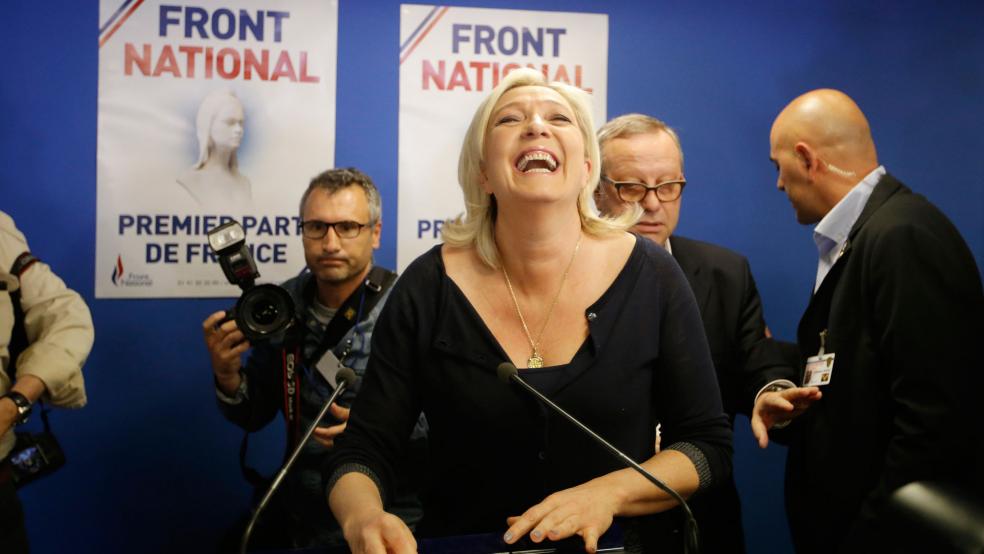The European Union was shocked by parliamentary elections that propelled right wing extremist parties to office. But anyone paying close attention to the mood of Europe should not have been surprised by the result.
That’s because the sentiments behind the election results have been building since the beginning of the euro crisis. Now, seven years after the onset of the Great Recession, the European Union has become a world of haves and have-nots, and the have-nots have little hope for improvement any time soon.
Related: Europe Takes Dangerous Turn to the Far Right
Part of the reason for this is lack of strong leadership. In France, where the far-right National Front won 26 percent of the vote, president François Hollande is often referred to as “flanby,” a caramel pudding with no form. In Spain, the two ruling parties failed to win 50 percent of the vote, leading to the resignation of Alfredo Pérez Rubalcaba, the leader of the Socialist Party. The inability of Greece’s coalition government to improve the economy opened the door to three lawmakers from the neo-Nazi Golden Dawn party, and they were elected.
Edward Goldberg, a professor at Baruch College and the New York University Center for Global Affairs, said that the failure of these leaders to make significant improvement’s to Europe’s economy led to the populist uprising witnessed in the EU elections.
“Without exceptional leadership or the total destruction of a war, it takes 100 years to change cultures,” he said.
The elections also serve as a rebuke to the monetary policies instituted across Europe in the wake of the sovereign debt crisis. Government spending cut backs have done little to ease unemployment for young people. Right now, some 5.4 million Europeans under 25 are unemployed -- a 23 percent unemployment rate.
Related: Germany's Tea Party: A Threat to European Unity
Goldberg said that anger from these young people is what propelled fringe parties to victory.
“When you have huge youth unemployment, you gave an election like you had on Sunday,” he said. “The purpose of democracy is that people can vent. These are people who got whacked in globalization. I call them the refugees of globalization.”
Unfortunately for these refugees, little is likely to change in the short term. The European economy has been making small gains recently, and the European Commission estimates that the EU economy will grow 2 percent in 2015.
However, this growth is unbalanced. Spain’s economy is not projected to grow at a fast enough pace to create jobs to alleviate a 25 percent unemployment rate. Neither is Portugal, where 17 percent of people are unemployed, or Greece, where 24 percent of people are out of work.
Little Prospect for Change
For Europeans out of work, there is little hope for a change in austerity policies instituted over the last four years. That’s because the German economic engine continues to chug along while demanding austerity elsewhere.
Related: Two Charts That Explain the 2014 Eurozone Crisis
The EU vote showed that the majority of German voters are happy with the status quo. There is an outlier -- a neo-Nazi was elected into parliament -- but the Alternative for Germany, the party that upset Germany’s political balance in last year’s national elections, took a step backwards. It got just 7 percent of German votes, far below the amount of votes received by anti-euro parties across the continent.
This is a reflection of the strength of the German economy; unemployment there is just 5 percent. Goldberg said that Germany Chancellor Angela Merkel’s ruling style also contributed to the containment with the status quo expressed by Germans Sunday.
“She knew that there were hesitations about the EU and bailing out Greece, but she gently moved forward and moved the German people to a place where this was acceptable, much like Franklin Delano Roosevelt did during the Great Depression,” Goldberg said.
Dangerous Rise of Populism?
The results of Sunday’s election are raising concerns of a populist revolution in Europe. And history shows that populism in Europe, most recently in Nazi Germany, can lead to disaster.
Konrad-Adenauer-Stiftung, a German think tank, warned that these elections could stir a populist fever across Europe. In a December 2013 report, the group argued that the elections would expose divisions within Europe. Their prediction may turn out to be correct.
“Harsh EU criticism is part of the regular repertoire," the authors of the study wrote. “This element is what makes the boundary between 'us', normal and righteous citizens, and 'them', the distant political bureaucrats so apparent.”
Top Reads from The Fiscal Times





